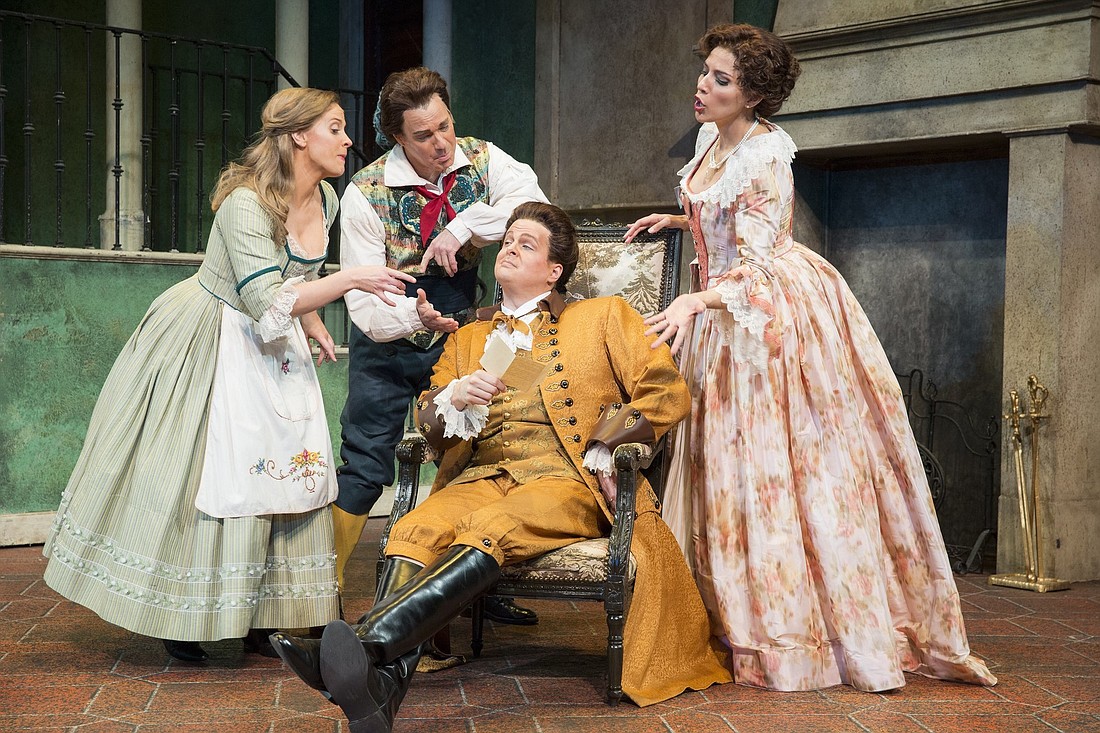- May 10, 2025
-
-
Loading

Loading

On the way back to our seats on opening night of Sarasota Opera’s “The Marriage of Figaro,” one woman gave us a knowing look and said, “Now we’ll find out if Figaro ever manages to get married.” Mozart wrote all sorts of road blocks into his timeless opera, along with so many twists and turns to the plot it’s hard to separate one misadventure from the next. But he did it with so much finesse, audiences over the centuries have simply gone with the flow and figured it would all work out in the end.
And, in Sarasota Opera’s production, work out it does with broad humor, some excellent voices, beautiful scenery and occasional bits of clever staging. There are even some stylistic ornaments dropped into arias as we make our way through the hilarious fiascos that befall almost everyone on stage. The problem is, the singing, staging and ornamentations are inconsistent so, just as we’re having a jolly good time revisiting our favorite operatic personalities, we’re brought back to reality by a misguided tempo, a wavering pitch or a voice that’s miscast for Mozart.
The problems began with the well-known Overture, which conductor Marcello Cormio took at a clip so fast he overlooked the miraculous colors and contrasts of Mozart. Dotted rhythms were often bypassed because tempos were more vivace than allegro. And those wondrously contrasting dynamics that make Mozart Mozart were flown over with little regard to style.
The singers had trouble keeping up with the pace set in the pit and, as a result, much of the Mozartean charm was lost. But some of them managed in spite of the conductor. Philip Cutlip as Figaro never faltered, and his well-balanced baritone and magnetism made him a lovable, clever (though occasionally duped) groom-to-be. From the opening, in which stage director Allison Grant had him measuring space in the bride and groom’s new bedroom with his hands — first counting out yards on the floor and then moving his wandering hands to his fiancée’s alluring waist — we knew the staging was going to be both clever and broad.
Some of the characters kept the slapstick to a minimum but still got hearty and well-deserved laughs in all the right places. Maeve Höglund’s Susanna (Figaro’s fiancée) was both beguiling and playful. Susanna is on stage more than she’s off, and almost everything in the opera centers on her ingenuity, shrewdness and skill as a sweet but clever young woman. Between her bright voice and appealing demeanor, Höglund gave us a memorable and winning Susanna.
Kristen Choi, a sprightly Studio Artist with the company, played the trouser role of Cherubino to perfection, vocally and dramatically, coming across as a lovestruck teenager who falls in love with everything in a skirt, gets himself in hot water every second and still has the audience rooting for him to the very end.
Sean Anderson was a swaggering stereotype-of-a-Count Almaviva, blusteringly jealous of his wife, desirous of the young, about-to-be-wed Susann and always wondering why the world is so against his possessive, self-aggrandizing manners. Anderson was in fine voice, but his voice wasn’t always suited to the subtleties of Mozart and, as a result, he sounded more like Iago in “Otello” than a Mozartean count.
Another oddly cast cast-member was Maria Antúnez, Countess Almaviva. Antúnez has a large, powerful, dark-hued voice that’s more suited to Verdi than Mozart. Her two big arias, “Porgi amor” and “Dove sono,” lacked the nuances and colors Mozart cries out for.
There are no really small roles in Mozart. All the characters, especially in this opera, are important parts of the ensemble. Ricardo Lugo was a sturdy Bartolo. Studio Artists Daryl Freedman (Marcellina), Jon Jurgens (Basilio), Peter Drackley (Don Curzio) and Joseph Ryan (Antonio) did well in their roles. And Natalie Almeter, a young artist from the Youth Opera, was a charming if occasionally tremulous Barbarina.
There are wonderful moments in this production, but there are also too many misinterpretations of what Mozart is all about: nuance, subtlety, refinement and restraint. It was opening night, so that may have added to the driven tempi and competitively loud singing. File down the rough edges and add a modicum of finesse, and you’ll have a brilliant production.